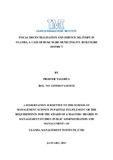| dc.description.abstract | This study looked at fiscal decentralization and service delivery in Uganda using a case study
of Rukungiri Municipality in Rukungiri District. The study reviewed assignment of
expenditure responsibilities, assignment of local tax collection; inter-government transfers
and how they affect service delivery. It was hypothesized that, assignment of expenditure
responsibilities, assignment of local tax collection, and inter-government transfers positively
affect service delivery. Empirical data was collected from the staff, Leadership and
beneficiaries of services in Rukungiri Municipality using a questionnaire, interviews,
observation, and documentary review. The study had 130 respondents from the targeted
population of 159. The sample was selected using simple random, stratified and purposive
sampling. Quantitative and qualitative data analysis methods were used to analyze collected
data and examine the effect of fiscal decentralization on service delivery in Uganda. The key
findings of the study indicated that there are significant positive effects between these
variables and service delivery. This implies that all the three fiscal decentralization attributes
that is; assignment of expenditure responsibilities, assignment of local tax collection, and
inter-government transfers positively affect service delivery in Rukungiri Municipality.
Based on the findings of the study, it is recommended that the existing assignment of
expenditure responsibilities be revised upwards by giving LGs more autonomy to further
improve service delivery; local tax sources’ administration should be thoroughly reviewed,
strengthened and legal adherence enforced; while inter-government transfers (both
conditional and unconditional grants), should be made equitable to meet the goals and
obligations of the municipality. Further research is recommended to cover other fiscal
decentralization and service delivery attributes and indicators and be conducted in a wider
population of municipalities in Uganda. | en_US |

